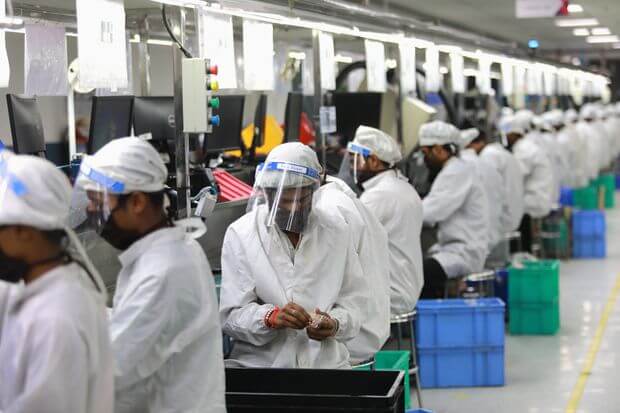 Budget allocation of 20 billion USD to 13 core sectors of the economy, under PLI scheme will encourage incentive-led manufacturing base and has the potential to position India in global value chain, said Ms Sumita Dawra, Additional Secretary, Department for Promotion of Industry and Internal Trade, Ministry of Commerce and Industry, Government of India (DPIIT), in a Virtual Open House Session on the Implications of PLI Scheme on India’s Manufacturing and Trade Competitiveness organized by the PHD Chamber of Commerce and Industry here today.
Budget allocation of 20 billion USD to 13 core sectors of the economy, under PLI scheme will encourage incentive-led manufacturing base and has the potential to position India in global value chain, said Ms Sumita Dawra, Additional Secretary, Department for Promotion of Industry and Internal Trade, Ministry of Commerce and Industry, Government of India (DPIIT), in a Virtual Open House Session on the Implications of PLI Scheme on India’s Manufacturing and Trade Competitiveness organized by the PHD Chamber of Commerce and Industry here today.
Ms. Dawra stated that the PLI scheme can boost R&D, economies of scale, meeting quality standard and therefore has the potential to create global champions in manufacturing. She stated that the PLI scheme for electronics 2020, notified mobile specific electronic components produced goods worth Rs. 54000 crores and investments worth Rs. 2300 crores between August 2020 and March 2021.
Ms. Dawra further explained that the Pharma sector, bulk drugs have received Rs. 5400 crore, medical devices- Rs. 870 crore and 3rd PLI for Pharma has received Rs. 15000 crores in investments; the food processing sector has received Rs. 34000 crores in investments and therefore, observed that the PLI scheme is already generating transformation and is expected to generate further benefits over the period of the next five years.
Dr. Ajay Dua , Former Secretary , Ministry of Commerce and Industry, Government of India stated that the eligible beneficiary of the scheme should be decided by the expert committee of Industry members and there should be legally enforceable contract in a court of law to gain the confidence of investors and increase the accountability of PLI beneficiary stakeholders.
Dr. Dua emphasized the need to strengthen general infrastructure support to all 13 sectors of the PLI and proposed that the Government can introduce PLI for private sector to create infrastructure. He stated that the PLI incentives should nurture the quality of the research and development of the pharmaceutical sector in the country and at the same time we should have WTO compliance norms .
Shri Kuntal Sensarma, Economic Adviser, Ministry of Food Processing Industries , Government of India mentioned that “Production Linked Incentive Scheme for Food Processing Industry (PLISFPI)” for implementation during 2021-22 to 2026-27 with an outlay of Rs. 10,900 crore to boost domestic manufacturing and attract large investment in food processing industries.
The objective of the scheme is to support creation of global food manufacturing champions, support Indian brands of value added food products in the international markets, increase employment opportunities for off-farm jobs, ensuring remunerative prices of farm produce and higher income to farmers.
He explained that the PLI aims to make Indian brands globally accepted. He mentioned that of the 13 sectors under the PLI scheme food processing and pharmaceuticals have ample scope for growth and expansion and also noted that the processing level is low especially in fruits and vegetables.
Shri Jay karan Singh, Trade Adviser, Ministry of Textiles, Government of India explained that the PLI scheme for the textile sector has been conceived as “Focus product intensive scheme”. The scheme to Textile manufacturing will offer a 5-year gestation period. He informed that for greenfield investments of minimum 300 crore and turnover of 600 core in first year, with 25 percent incremental turnover in next three to four years will be given an incentive of 15% in production.
Shri Sandeep Aggarwal, Chairman, Industry Affairs Committee, PHD Chamber in his welcome remarks stated that earlier Japan and U.S were the largest producers of optical fibre. Now china produces more than 50% of the optical fibre because of various interventions undertaken by the Government of China. Therefore, government support in investment and technology is crucial for boosting manufacturing.
Mr. Aggarwal stated that in the U.S, the government used to buy products that had 90% local content, both financial assistance and orders where given to the private industry by the government- In this regard PLI is an important factor. He quoted example of textile units in England where the government in earlier times would offer credit to textile mills to encourage them to boost their manufacturing and at the same time tax raw material of other countries to make them less competitive.
He explained that in the wake of the international trade regulations, the production linked incentive scheme (PLI) is probably the best scheme to make the Indian manufacturing sector more competitive. He also opined that this the best time for implementing PLI scheme in India as Bangladesh is in the verge of coming out from the LDS status and a huge exodus of Industry may come to India. He suggested creating a real time basis information sharing link on PLI to deliver benefits of the scheme to the stakeholders.
Shri Vishwanath, Co-Chairman, Industry Affairs Committee, PHD Chamber, presented a vote of thanks to the dignitaries and stated that PLI scheme would be a miracle for India’s manufacturing and trade competitiveness, by ensuring certainty in scheme implementation and creating centralized exclusive portal of PLI for beneficiaries of the scheme.
Shri Saurabh Sanyal, Secretary General, PHD Chamber, suggested to include medicinal plants and Ayush products in PLI scheme to deliver benefits of it to Indian farmers and exporters.
Dr. S.P Sharma, Chief Economist, PHD Chamber, moderated the session and ensured the members to conduct frequent sessions on PLI and manufacturing related issues in future also . He thanked the dignitaries for sharing their valuable time and insightful discussions.
PHD Chamber of Commerce and Industry’s webinar was supported by DLF India; Multani Pharmaceuticals Ltd; JK Tyre & industries ltd; Marble City; Paramount Cables ltd; SMC Investments and Advisors Limited; Blossom Kochhar Aroma Magic; DCM Shriram Industries Ltd; Radico Khaitan ltd Timberworkz and Synergy Environics Ltd.










